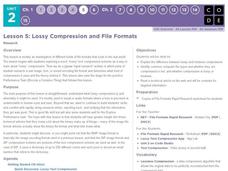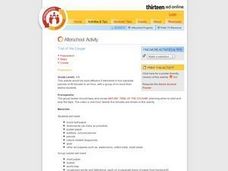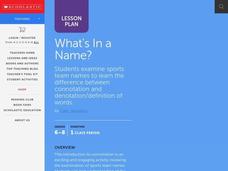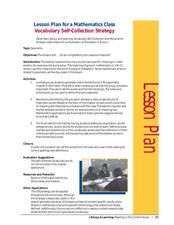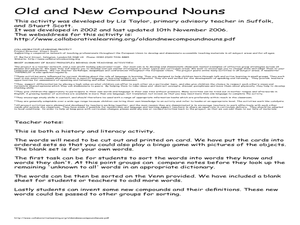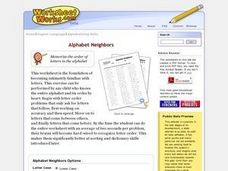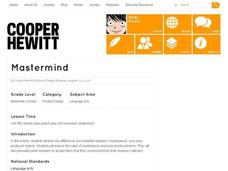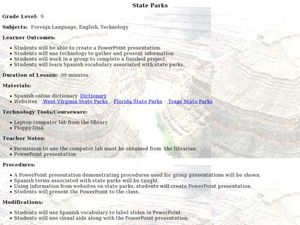Curated OER
Understanding and Using Primary and Secondary Sources in History
Explore primary and secondary sources in this historical analysis lesson. Young researchers define the terms primary source and secondary source. They read a primary source document provided by the teacher and answer questions about the...
Curated OER
Writing Myths I
Explain a natural phenomenon in an original myth. After researching the phenomenon they have chosen, young readers use factual information to include in their myth. They find synonyms and new phrases to create vivid images as they write...
Curated OER
The Daily Idiom
What is an idiom? Learners identify and read common idioms. They discuss what idioms are, and are given a black line master embedded in the plan that has 100 common idioms. Next, they complete "The Daily Idiom" worksheet, which is...
Code.org
Lossy Compression and File Formats
I'm compressed. Groups do a rapid research of different file types to determine what kind of compression the formats use and how it works. They share their information with the rest of the class until everyone has all the information for...
Curated OER
Trail of the Cougar
Learners examine cougar behavior, habitat, social organization, efforts to support their survival and the threats to it. They create posters to present information about cougars.
Curated OER
Measurement: Finding Areas of Rectangles
Gardening geometers construct the formula for the area of a rectangle by viewing a video revolving around two young people, their lawn mowing business, and their need to charge by the square meter. A relevant real-life application lesson!
Curated OER
What's In a Name?
Introduce your language arts class to connotation, denotation, and diction. Middle schoolers identify and differentiate between the connotative and denotative meanings of words by analyzing the fictitious sports team names. Learners...
Curated OER
Expanding Your Horizons
In this career categories worksheet, students complete a chart the requires them to add specific jobs titles under the appropriate headings. Students also research career options and fields they are interested in.
Curated OER
Vocabulary Self-Collection Strategy
Dedicate one or two class periods to creating a class glossary of geometry terms. Many geometry terms also appear in our every day vocabulary, but they have very different meanings. For example, the word gross in geometry is very...
Curated OER
The History of Mathematics
Research the interrelationship between math and science. Search the Internet to discover the history of several branches of mathematics and make text-to-world connections between the concepts covered in each branch with related...
Curated OER
Branding Circles, Squares, Rectangles, Triangles
Compare and classify 2-D shapes! Kindergarteners inspect the attributes of plane shapes and examine shapes in everyday life. They label the circles, squares, rectangles, and triangles they find. This is the website where you can find the...
Curated OER
Prefixes
Provide an opportunity for scholars to play around with words. They start with 12 root words and add prefixes to them to create new ones. There are five prefixes here, and learners list the new words beside each. Consider reviewing the...
Curated OER
Romare Bearden and the Face Collage
Fourth graders create a collage from magazines and newspapers to create a face. After finishing the face, they use mixed media to complete the background. They write their own description and examine the life and works of Romare Beardon.
Curated OER
Corn Prints and Henri Matisse
Fourth graders observe prints and paintings as the teacher discusses various design elements (repetition, variety, texture, pattern, etc.) used by the artist Henri Matisse. They look at and discuss Indian corn and then make a print that...
Curated OER
Poetry
Twelfth graders examine the main characteristics of poetry. They read and discuss a handout on the characteristics of poetry, read the poem, The Road Not Taken, discuss their interpretation of the poem, and research poetry on the Internet.
Curated OER
Grammar: Subject-Verb Agreement
High schoolers review basics of subject and verb agreement, and write sentences in which the subject and verb are in agreement.
Curated OER
Old and New Compound Nouns
In this compound nouns worksheet, students cut out cards with compound nouns on them and put them into a Venn diagram. Students have 36 cards to put into the Venn diagram.
Curated OER
Describing Vocabulary for Cinema, Movies, and Stars
Students name their favorite actors and actresses, and then use adjectives to describe them. They go through a list of actors and actresses and discuss the adjectives they used to decribe them. As an extension, they can write about a film.
Curated OER
Writing - The Persuasive Essay
Students, in groups, work together to develop a five-paragraph essay that defends the group's viewpoint on an assigned topic. Each student in the group writes one paragraph.
Curated OER
Alphabet Neighbors: Before, After, In Between
In this language arts learning exercise, students memorize the order of letters in the alphabet. Students complete 18 examples where the missing letter comes before a series of letters. Then students complete 18 examples where the...
Curated OER
Sk8er Boi (Skater Boy)
Students listen to and analyze the lyrics for Avril Lavigne's song, Sk8er Boi. They discuss and interpret the vocabulary, phrasal verbs, and various grammar structures used in the lyrics.
Curated OER
An Illustrated Guide to the Late 1800's
Eleventh graders investigate the time of the late 1800's. They conduct research using a variety of resources that could include the internet. Students create an alphabetized encyclopedia of important historical people of the time period.
Curated OER
Mastermind
Students observe the differences and similarities between "masterpieces" and mass-produced objects. They analyze the value of masterpieces and mass-produced items. Students persuade panel members to accept items that they recommend into...
Curated OER
State Parks: A Spanish Vocabulary Lesson
Ninth graders create a PowerPoint about state parks using Spanish vocabulary. In this Spanish lesson, 9th graders work in groups to research about area recreational facilities. Students use information collected on-line to create and...





